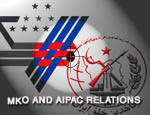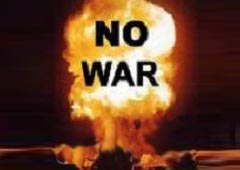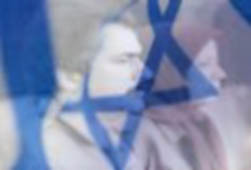– According to reports, AIPAC " American Israeli Public Affairs Committee’’, the strongest lobbying group in Congress, has a great weight among neo conservatives who are seeking the option of regime change in Iran. Also, the neocon senators and representatives including Ilenea Ros-Lehtinen, Bob Filner … support the regime change in Iran sponsoring Mujahedin-Khalq as a viable alternative for clerical regime of Iran. In an interview with Masud BaniSadr, a former member of MEK, on May 19th 2006, ‘’Dissident and defection: An Iranian confession" Mahan Abedin the Middle East analyst at Asia Times asked about the likely relation between AIPAC and MEK: Dissent and defection: An Iranian confession By Mahan Abedin, 19 May 2006 (source: Asia Times) …Mahan Abedin: Explain the dynamics in the MEK-Israel lobby relationship. Masud Banisadr: If there is an anti-Iran petition on the table in the Congress, the two lobbies would work hand-in-hand to promote it, without necessarily communicating directly. MA: Are the two lobbies organizationally linked? MB: To give you an example, we knew which members of Congress were influenced by AIPAC [American Israel Public Affairs Committee], so when we needed signatures we’d go to these congressmen first. AIPAC has a lot of weight in Congress, and without having to communicate with them directly, we benefited enormously from their deep influence. We also copied their lobbying techniques. Consequently the Mujahideen’s lobby in the US is organizationally strong but it lacks the two core elements I outlined earlier, namely numbers and money. They have a tiny constituency among Iranian-Americans, and even with the addition of imaginary names and addresses they cannot deliver votes or similar political advantages to congressmen. It also lacks an independent financial base. Much of its funding came from the former Iraqi regime. MA: Your claim that there were no direct contacts between the MEK and the pro-Israel lobby is undermined by the organization’s intensive and very direct cooperation with the "Iran Policy Committee", which seems to be a spin off of AIPAC. There are also regular media reports alluding to direct MEK-Israel ties. MB: I would not be surprised if these links existed. As I said earlier, the MEK is exclusively motivated by the interests of the cult, and as such it will cooperate with any constituency. If there is any hesitation in collaboration, it stems from Israeli reluctance, since the Mujahideen, because of its close relationship with the PLO [Palestine Liberation Organization], is not fully trusted by the Israelis. On the other hand, from an Israeli perspective, the MEK is the only viable tool against Iran. Monarchists are deeply divided and lack organization. However, Western and Israeli intelligence are well aware of the MEK’s limitations. They are perfectly aware of the cult nature of the organization and know that it has – at most – around 5,000 members and active sympathizers (most of whom are stranded in the Ashraf camp in Iraq) and are in no position to seriously threaten the Iranian government. This factor – coupled with the organization’s cult-like and totalitarian ideology – dissuades the US State Department from working with them. To put it simply, the Americans do not trust Mujahideen-e-Khalq, for they know they have no principles, save the interests of the cult. This is why, despite all the efforts of the organization in the past quarter-century, they have not been able to pass a single substantial resolution in support of the organization in Congress. Note also that the US government regards the Mujahideen as a terrorist organization and does not want to create another al-Qaeda… – As Professor Juan Cole at Antiwar Website explains in his article titled " AIPAC’s Overt and Covert Ops", he brings into question the key role of Israel to lead US policy toward Iran fomenting a second war against Iran: AIPAC’s Overt and Covert Ops
strongest lobbying group in Congress, has a great weight among neo conservatives who are seeking the option of regime change in Iran. Also, the neocon senators and representatives including Ilenea Ros-Lehtinen, Bob Filner … support the regime change in Iran sponsoring Mujahedin-Khalq as a viable alternative for clerical regime of Iran. In an interview with Masud BaniSadr, a former member of MEK, on May 19th 2006, ‘’Dissident and defection: An Iranian confession" Mahan Abedin the Middle East analyst at Asia Times asked about the likely relation between AIPAC and MEK: Dissent and defection: An Iranian confession By Mahan Abedin, 19 May 2006 (source: Asia Times) …Mahan Abedin: Explain the dynamics in the MEK-Israel lobby relationship. Masud Banisadr: If there is an anti-Iran petition on the table in the Congress, the two lobbies would work hand-in-hand to promote it, without necessarily communicating directly. MA: Are the two lobbies organizationally linked? MB: To give you an example, we knew which members of Congress were influenced by AIPAC [American Israel Public Affairs Committee], so when we needed signatures we’d go to these congressmen first. AIPAC has a lot of weight in Congress, and without having to communicate with them directly, we benefited enormously from their deep influence. We also copied their lobbying techniques. Consequently the Mujahideen’s lobby in the US is organizationally strong but it lacks the two core elements I outlined earlier, namely numbers and money. They have a tiny constituency among Iranian-Americans, and even with the addition of imaginary names and addresses they cannot deliver votes or similar political advantages to congressmen. It also lacks an independent financial base. Much of its funding came from the former Iraqi regime. MA: Your claim that there were no direct contacts between the MEK and the pro-Israel lobby is undermined by the organization’s intensive and very direct cooperation with the "Iran Policy Committee", which seems to be a spin off of AIPAC. There are also regular media reports alluding to direct MEK-Israel ties. MB: I would not be surprised if these links existed. As I said earlier, the MEK is exclusively motivated by the interests of the cult, and as such it will cooperate with any constituency. If there is any hesitation in collaboration, it stems from Israeli reluctance, since the Mujahideen, because of its close relationship with the PLO [Palestine Liberation Organization], is not fully trusted by the Israelis. On the other hand, from an Israeli perspective, the MEK is the only viable tool against Iran. Monarchists are deeply divided and lack organization. However, Western and Israeli intelligence are well aware of the MEK’s limitations. They are perfectly aware of the cult nature of the organization and know that it has – at most – around 5,000 members and active sympathizers (most of whom are stranded in the Ashraf camp in Iraq) and are in no position to seriously threaten the Iranian government. This factor – coupled with the organization’s cult-like and totalitarian ideology – dissuades the US State Department from working with them. To put it simply, the Americans do not trust Mujahideen-e-Khalq, for they know they have no principles, save the interests of the cult. This is why, despite all the efforts of the organization in the past quarter-century, they have not been able to pass a single substantial resolution in support of the organization in Congress. Note also that the US government regards the Mujahideen as a terrorist organization and does not want to create another al-Qaeda… – As Professor Juan Cole at Antiwar Website explains in his article titled " AIPAC’s Overt and Covert Ops", he brings into question the key role of Israel to lead US policy toward Iran fomenting a second war against Iran: AIPAC’s Overt and Covert Ops
August 30, 2004
by Juan Cole Antiwar.com
..The neoconservatives have some sort of shadowy relationship with the Mujahadeen-e Khalq Organization, or MEK. Presumably its leaders have secretly promised to recognize Israel if they ever succeed in overthrowing the ayatollahs in Iran. When the U.S. recently categorized the MEK as a terrorist organization, there were howls of outrage from "scholars" associated with the Washington Institute for Near East Policy, such as ex-Trotskyite Patrick Clawson and Daniel Pipes. MEK is a terrorist organization by any definition of the term, having blown up innocent people in the course of its struggle against the Khomeini government. (MEK is a cult-like mixture of Marx and Islam). The MEK had allied with Saddam, who gave them bases in Iraq from which to hit Iran. When the U.S. overthrew Saddam, it raised the question of what to do with the MEK. The pro-Likud faction in the Pentagon wanted to go on developing their relationship with the MEK and using it against Tehran. So it transpires that the Iranians were willing to give up 5 key al-Qaeda operatives, whom they had captured, in return for MEK members. Franklin, Rhode and Ledeen conspired with Ghorbanifar and SISMI to stop that trade. It would have led to better U.S.-Iran relations, which they wanted to forestall, and it would have damaged their protégés, the MEK. Since high al-Qaeda operatives like Saif al-Adil and possibly even Saad bin Laden might know about future operations, or the whereabouts of bin Laden, for Franklin and Rhode to stop the trade grossly endangered the United States. The FBI has evidence that Franklin passed a draft presidential directive on Iran to AIPAC, which then passed it to the Israelis. The FBI is construing these actions as espionage or something close to it. But that is like getting Al Capone on tax evasion. Franklin was not giving the directive to AIPAC in order to provide them with information. He was almost certainly seeking feedback from them on elements of it. He was asking, "Do you like this? Should it be changed in any way?" And, he might also have been prepping AIPAC for the lobbying campaign scheduled for early in 2005, when Congress will have to be convinced to authorize military action, or at least covert special operations, against Iran. AIPAC probably passed the directive over to Israel for the same reason – not to inform, but to seek input. That is, AIPAC and Israel were helping write U.S. policy toward Iran, just as they had played a key role in fomenting the Iraq war… – The spying role of Americans for Israel, was sought in an article published at UPI written by Richard Sale. His documented research presents the focus of FBI on a meeting in Paris, attended by Rhode (a member of Near East/ Sauth asia Office)Larry Franklin ( US air force reserve colone ),Gerechet ( a former CIA Operative) with the MEK: DOD spy’s arrest imminent By Richard Sale UPI Intelligence Correspondent …Stephen Green, author of two books on U.S.-Israeli relations and former CIA counter-terrorism chief, alleges that in March 1983 Feith was fired from the National Security Council by Judge William Clark after Feith was discovered to be the object of an FBI probe alleging that he had passed classified information to Israel. Former CIA counter-terrorism chief Vince Cannistraro confirmed to UPI the firing of Feith in the 1980s. Feith did not return repeated phone calls. According to a federal law enforcement official, other Pentagon officials of initial interest included Bill Luti, a former Navy captain who ran the day-to-day office operations of OSP, and Harold Rhode, a prominent member of the Near East/South Asia office, a sister office of OSP. According to sources who have been briefed on the case, the focus of the FBI probe finally settled on a meeting in Rome in December 2001, attended by Rhode and Franklin who met with an Iranian, Mansur Ghorbanifar, the notorious Iranian middleman in Oliver North’s 1980s scheme to craft an arms-for-hostages deal, later named Iran Contra. The head of Italy’s military intelligence also attended, according to these sources. At that meeting, Ghorbanifar offered to put the Bush administration in touch with "elements in Tehran who could mount a coup with U.S. help," one source close to the case said. The meeting was brokered by Michael Ledeen, a major figure in the Iran-Contra scandal of the mid-1980s, according to a source with close knowledge of the case. The meeting allegedly took place with the knowledge of the White House, but White House officials denied that they had known Ghorbanifar was to be there, according to a recent Los Angeles Times account. Other sources briefed on the case, however, said another meeting occurred in Paris in June 2002 when Rhode "accidentally" bumped into Ghorbanifar, a meeting attended by Franklin, Rhode and Ruel Marc Gerecht, a former CIA operative, now a scholar with the American Enterprise Institute, and an assistant to Richard Perle, a former senior Defense Department official during the Reagan administration. Sources close to the case also said that the meeting "was prearranged" and involved representatives of the Mujahedin al-Kahlq, an Iranian group of exiles, to discuss assistance to the MEK for the purpose of destabilizing the current government of Iran. "According to a congressional investigative memo, these meetings were arranged by Gerecht and Ledeen. Ledeen denies this. "The only meeting I knew about was the December meeting," he said. "I don’t know about the others, if they in fact existed."
Ledeen denounced the Franklin case as "total bullshit and lies."
Gerecht did not return phone calls. One source with close knowledge of the case said that the Franklin-Rhode- Gerecht meetings with the MEK, which is on the State Department’s list of terrorist organizations was "served to undermine (Secretary of State) Colin Powell’s effort to sustain dialogue with moderate elements within the Iranian government." The MEK is still listed on the State Department’s list of terrorist groups because they have killed American officials, according to a State Department official. When questioned by congressional investigators, Luti "and other senior Defense officials denied that there was any serious consideration of using the MEK terrorists to destabilize the Iran regime," according to a source briefed on the case… – While Raymond Tanter, one of the cheer leaders of supporting MEK who has founded IPC (Iran Policy Committee ) works closely with AIPAC, seeking the removal of MEK’s terrorist label, Kenneth Timmerman,the executive director of the foundation for Democracy in Iran, asks How MEK a terrorist designated organization can operate in the US so freely: Iran Freedom and Regime Change Politics
ALARAB ONLINE
By Tom Barry*
…The American Israeli Public Affairs Committee (AIPAC) is the most prominent lobbying group pressing for congressional approval of the Iran Freedom Support Act. After the House’s approval of the bill, AIPAC told its members and supporters: “Please thank your Representative for voting for the bill and urge your Senators to co-sponsor S.333.” On its website, AIPAC lists the 58 senators who have already agreed to support the companion bill when it comes to the Senate. The Senate bill counts on such Democrats as Barbara Boxer, Maria Cantwell, Dianne Feinstein, and Barbara Mikulski as well as such conservative Democrats as Joe Lieberman and Mary Landrieu. While AIPAC is the most powerful group advocating a tougher U.S. policy toward Iran, numerous other pressure groups calling for regime change in Iran have emerged over the past several years. One of the earliest, the Coalition for Democracy in Iran (CDI), formed in late 2002, ceased functioning in mid-2005. Operating out of the office of Morris Amitay, the former director of AIPAC, CDI worked closely with AIPAC to encourage Congress to pass resolutions condemning Iran. The CDI principals continue their efforts to promote regime change in Iran through other organizations, including the Foundation for Democracy in Iran, Foundation for the Defense of Democracies, Committee on the Present Danger, and the American Enterprise Institute. Raymond Tanter, one of the original members of the Coalition for Democracy in Iran, founded the Iran Policy Committee (IPC) in January 2005. Tanter, who was a senior staff member of the National Security Council during the Reagan administration, is also associated with several other right-wing policy organizations, including the Washington Institute for Near East Policy, Middle East Institute, and the Committee on the Present Danger. Since its founding the Iran Policy Committee has sponsored conferences and policy briefings on the Hill, and has also published four policy papers—a common theme being that the U.S. government should declassify the People’s Mojahedin Organization of Iran (PMOI/MEK) as an international terrorist organization and recognize it as being the “indisputably largest and most organized Iranian opposition group.” According to Kenneth Timmerman, executive director of the Foundation for Democracy in Iran, the MEK (Mujahedin-e Khalq) is shifting its militant rhetoric and is now claiming to be a nonviolent, pro-democracy group. The MEK, which is characterized as a terrorist group, operates a political front organization called the National Council of Resistance of Iran, which is sponsoring conferences in Paris and Washington during the last week of May on regime change in Iran. The Paris conference, according to Timmerman, is being organized by the London-based Gulf Intelligence Monitor. Timmerman reports that the “five American participants—Ray Tanter, Maj. Gen. (ret.) Paul Vallely, Lt. Gen. (ret.) Thomas McInerney, Navy Capt. (ret) Chuck Nash, and Lt. Col. (ret). Bill Cowan—are all members of the Iran Policy Committe e, an organization set up by Tanter and by former CIA officer Clare Lopez in early 2005.” According to Timmerman, “The group has published a number of ‘white papers’—all of which have one thing in common: they urge the Bush administration to take the MEK and its various front organizations off the State Department list of international terrorist organizations.” Timmerman asks where the MEK is getting the money to finance the conferences and why the FBI is allowing an international terrorist organization to operate openly in the United States. Clare Lopez, the executive director of the Iran Policy Committee, is, like Tanter, a resident scholar at the Middle East Institute. Another leading member of IPC is Bruce McColm, who is the president of the Institute for Democratic Strategies and the former president of the International Republican Institute. Most of the other principals of IPC are retired military officers. The U.S. government has committed at least $75 million for projects that directly or indirectly support a regime change strategy in Iran. Over the last couple of years, several million dollars in U.S. democracy assistance aid for Iran has been distributed to an array of organizations, including Freedom House, a neocon led organization in Washington. New funding would also be channeled to Iranian dissidents, mostly expatriates, although groups like IPC would like to see the MEK, which has bases in Iraq, benefit from U.S. “democracy building” funding…
Download MKO and AIPAC Relations
Download MKO and AIPAC Relations




